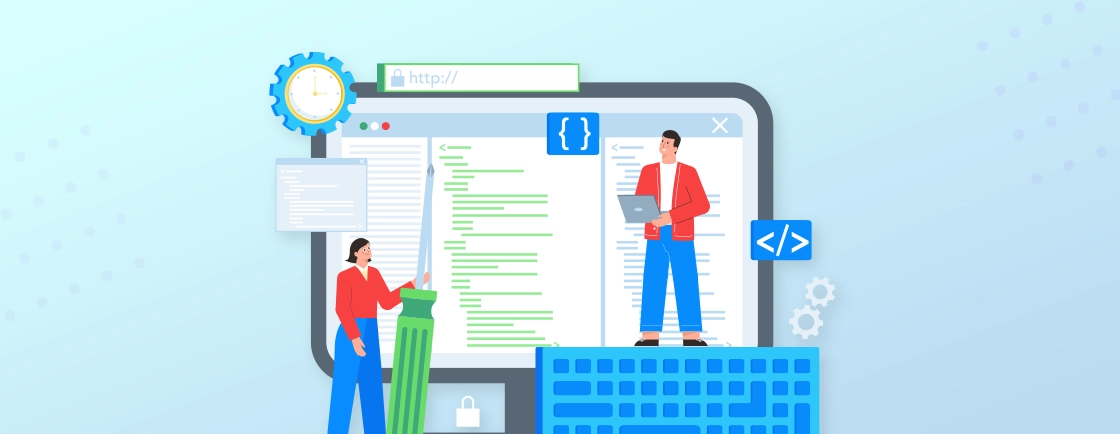Table of Contents
A website requires a host of features and functionalities, along with captivating design and UI elements to be successful. How does it all come together? That’s the magic of a full-stack developer. Their expertise to craft both the frontend and backend make a website tick.
They can handle the entire development process (from design to database management) with a well-rounded skill set for a cohesive cycle. This translates to cost-effectiveness, streamlined communication, and a high-quality website.
Who is a Full-Stack Developer?
A full-stack developer is a skilled professional with expertise in both frontend and backend web development. They possess understanding of the entire web development process, from concept to deployment. That includes designing user interfaces, developing server-side logic, managing databases, and ensuring a functional website.
In simpler terms, a full-stack developer can handle both the “what users see” and the “how it works” aspects of web development. And they can combine advanced tech and emerging tactics to ensure a more effective development.
What Does a Full-Stack Developer Do?
Full-stack developers are the ultimate solution for building websites. Unlike other specialized developers, full stack can work on all aspects of the development process. But what exactly does full-stack developers do? Let’s dive into it.
Frontend Development
They develop the front-end of the website i.e. creating user interface and how the buttons and layouts are going to be. This can be done using various technology as below:
- HTML & CSS: These are the building blocks of any webpage. Full-stack developers use HTML to create a basic structure and then CSS to make the site visually appealing. You can also choose from the best web development frameworks for faster build.
- JavaScript Frameworks: Full-stack developers use JavaScript frameworks like React or Angular to add the dynamics and interactiveness to a website. These frameworks help them create the best responsive UI with interactive forms, real-time data updates, etc.
The key focus while creating the front-end is to keep the site user-friendly by simplifying navigation and providing visual aesthetics.
Backend Development
Backend development is the creation of functions and database schema for the website. This is the unseen part of the website, it handles complex functionality and process data ensuing everything runs smoothly. Here is how they could do this:
- Server-Side Programming: Unlike font-end, the back-end operations are hidden from the user. Full-stack developers use server-side languages like Python, JavaScript, or PHP for efficient coding. This code acts as the engine, handling tasks like user authentication and interacting with databases.
- Database Management: Every website needs to store data effectively and optimally. Full-stack developers store, retrieve, and manipulate this data using platforms like MySQL or PostgreSQL.
The key focus is building an optimal and secure back-end that can handle high volume of traffic and operate smoothly.
API Integration
API integration is a part of back-end development, where developers integrate various services like payment gateway or social media platforms. Full-stack developers are the specialist when it comes to integration, as their area of work includes all the aspects of development.
Furthermore, full-stack developers use web development tools to build a unique site that fits your requirements. Our team delivers full stack development services designed to handle everything from database architecture to interactive UI, giving you a complete solution under one roof.
Key Skills of a Full-stack Web Developer
A full-stack developer is the one who is expert on both front-end and back-end. To create an optimal website their skills should include two main categories: technical skill and soft skills.
A knowledge about the best tech stack for 7development of websites comes under this section. Here is the breakdown of the key skills:
- Front-End Languages and Frameworks: This includes the building blocks of web development like HTML, CSS, and JavaScript. Additionally, familiarity with popular frameworks like React, Angular, or Vue.js is a major plus.
- Back-End Programming Languages and Frameworks: Languages like Python, Java, or Node.js power the server-side logic. Frameworks like Django, Ruby, or Express.js can make back-end development even more effective.
- Databases and Data Storage: Understanding how to store and manage data efficiently using relational databases (MySQL, PostgreSQL) or NoSQL databases (MongoDB) is crucial.
- Version Control Systems (VCS): Tools like Git are essential for tracking code changes, collaboration, and maintaining a project’s history.
- APIs and Integrations: Full-stack devs should be comfortable working with APIs to connect their applications with external services.
- Deployment and Server Management: Publishing websites and applications to servers and ensuring their smooth operation requires basic server management skills.
And there are some additional skills that are important for maintaining the quality and efficiency of the project.
- Problem-Solving: Full-stack development involves dealing with complex challenges. Strong analytical and problem-solving skills are crucial for problem solving.
- Communication: Collaborating with designers, project managers, and other developers requires clear and concise communication.
- Teamwork: Full-stack developers are often part of a larger team. The ability to work effectively within a team is essential.
Having this skill possessed by a developer makes them a full-stack developer. The area of technology can vary for different requirements, but the aspect remains the same. With this, let’s find out how to hire the right candidate for full-stack development.
How to Hire a Full-stack Developer?
Full-stack developers are highly in demand, because of their versatile ability. But with the ever growing needs and competition, it’s crucial to find a candidate who possesses the right skill. Here’s how you can hire a full-stack developer.
Step 1: Define Your Needs
Before beginning on your hiring journey, define your project requirements and define various aspect such as:
- Project Scope: Clearly outline the functionalities and features you envision for your website.
- Technical Stack Expertise: Determine the specific technical skills required for your project (e.g., experience with a particular framework).
- Experience Level: Consider the project’s complexity and whether a junior, mid-level, or senior developer is the right fit.
By clearly outlining your needs, you’ll attract qualified candidates and streamline the selection process.
Step 2: Craft Clear Job Description
Your job description is the first impression you make on potential candidates. Here’s what you can do to craft a better job description.
- Clearly articulate the role and responsibilities: Highlight the specific technical skills and experience you require.
- Showcase your company culture: Let candidates understand your work environment and values to attract those who align with your vision.
- Outline the project and its goals: Briefly describe the web application you’re building and mention their role in the development process.
- Mention any perks or benefits: Competitive compensation, a stimulating work environment, or opportunities for professional development can get you a better candidate.
A clear job description would help define a hypothetical candidate before you start exploring the hiring platforms.
Step 3: Identify Potential Candidates
Once your job description is ready, now you begin to find the candidate through various sources that includes:
- Freelance Platforms: Explore platforms like Upwork or Fiverr for freelance full-stack developers if your project has a shorter time frame.
- Professional Networking: Reach out to your professional network or connect with developers on platforms like LinkedIn.
You can also consult with a professional agency for a more well-rounded project coverage. You get a team of experts who can take care of every aspect of the website.
Step 4: Evaluate Skills Effectively
Resumes provide a glimpse into a candidate’s experience, but true potential is often recognized through an interview process. Here are some methods for evaluating skills:
- Technical Screening: Use online coding challenges or technical quizzes to assess a candidate’s proficiency in specific programming languages and frameworks.
- Portfolio Review: Check the portfolio showcasing the candidate’s past projects. So you can evaluate their coding style, problem-solving approach, and experience with relevant technologies.
- Technical Interviews: Conduct in-depth technical interviews to know more about the candidate’s knowledge of specific technologies and abilities.
This step will, most probably, bring the list of candidates down to just a handful. Then it will be the time to make a concrete, well-informed decision.
Step 5: Make an Informed Decision
For the final decision, there are various factors to consider, while some are mentioned below:
- Evaluate All Aspects: Don’t just rely on technical skills. Consider the candidate’s communication style, enthusiasm, and performance.
- Reference Checks: Always conduct reference checks with past employers to verify experience and work ethic.
- Negotiate and Offer: Present a competitive offer package that reflects the developer’s skills and your company culture.
By following the above steps, you can hire a full-stack developer for getting your website ready. But for more complex projects, it’s often better to opt for a web development agency. Their skills, resources, and expertise can help you with a more efficient and better collaborative development process. With our web development services, you get access to vetted talent who can step into your project and start delivering results immediately.
Advantages of Hiring a Full-Stack Web Developer
Web development industry is fast-evolving. New technologies and techniques are coming out faster than ever before. So how do you ensure a high-quality well-rounded development? Well, hiring a full-stack developer would help for a few reasons.
- Cost-effectiveness: A single full-stack developer can handle tasks that would typically require multiple specialists. That results in significant cost savings on salaries and recruitment.
- Faster Development: Full-stack developers possess knowledge in every domain, removing communication gaps between front-end and back-end teams. This creates a smoother workflow and faster project completion.
- Streamlined Communication: They can explain technical aspects to non-technical stakeholders, bridging the gap between development and other departments.
- Improved Problem-Solving: As they have complete understanding of tech stack, it allows them to identify and solve issues efficiently.
- Enhanced Flexibility: The ability to handle both front-end and back-end tasks makes full-stack developers highly adaptable. They can seamlessly switch between tasks as project needs evolve, ensuring a more flexible development process.
- Scalability for Small Teams: For companies starting small or startups, full-stack developers can eliminate the need of a development team cutting initial cost.
Conclusion
Full-stack developers create well-rounded, user-friendly, and functional web experience. Their ability to bridge the gap between front-end and back-end functionality makes them a preferable choice. And they can streamline communication, boost project efficiency, and ultimately, deliver exceptional results.
FAQs About Full-Stack Developer
What skills are required to become a full stack web developer?
To be a full-stack developer one must know various programming languages such as HTML, CSS, JavaScript, PHP, Python for the development. Plus, you should also have knowledge of databases, API and other frameworks to become a full-stack developer.
How can I improve my skills as a full stack web developer?
To improve your skills, you can contribute to open source and can learn from tutorials and documentation. You can also attend workshops, conferences, and online courses to enhance your knowledge and skills in this field.
What are the benefits of hiring a full-stack developer for a small business?
For small businesses or startups with limited resources, a full-stack developer can be a beneficial investment. They can handle a broader range of tasks, reducing the need to hire multiple developers making development cost-effective.
Explore Our Expert Guides
Dive into detailed tutorials, tips, and strategies designed to help you grow, innovate, and solve problems efficiently.





